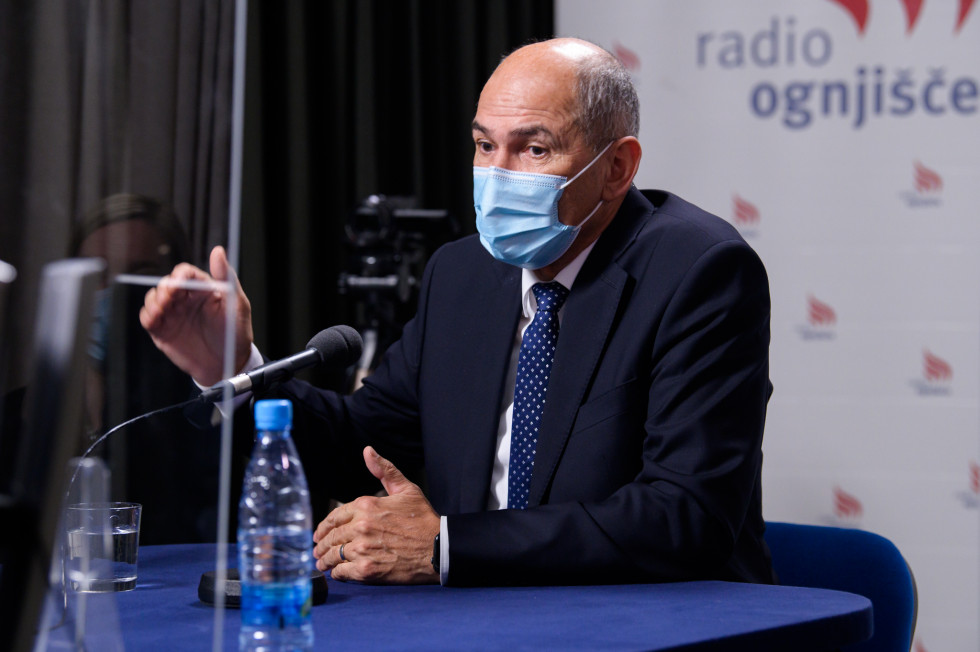By: UKOM
On 23. November Prime Minister Janez Janša was a guest on the show “Pogovor o” (Talk about) on Radio Ognjišče, moderated by Marta Jerebič and Tanja Dominko. The interview focused on the COVID-19 epidemic, the current work of the Government, relations within the coalition and the Slovenian Presidency of the Council of the EU.
The Prime Minister first spoke about tackling the COVID-19 epidemic. He pointed out that the situation was serious everywhere and that European countries were more or less taking similar measures. Austria, in an attempt to save the ski season during the Christmas and New Year holidays, has decided to impose a lockdown. In Slovenia, the recovered/vaccinated/tested rule is in force and, if adhered to, it can make a significant contribution to improving the situation. As regards vaccination, the Prime Minister drew attention to Slovenia’s relatively low vaccination coverage, which is increasing the pressure on the healthcare system and hospitals, and prolonging the epidemic. “When you are vaccinated, you protect not only yourselves, but also others.” He went on to talk about the self-testing of primary school pupils, saying that recently the highest number of positive cases detected by rapid antigen tests had been among primary school pupils. “When the testing among primary school pupils started, it seemed that there were very few problems, but many benefits.” The rapid testing of primary school pupils means that infections are detected in time, infected pupils are isolated and infections are not transmitted. As a result, fewer people are infected, there is less pressure on healthcare staff and capacities, and those who do not have COVID-19 and require treatment can be treated.
As regards communication during the epidemic, the Prime Minister said that communication elsewhere was not much different than in Slovenia. By communicating through social networks, the Government was able to present certain measures to the public, which the national media did not want to communicate. In some cases, media coverage was not balanced. When asked about the drop in the level of communication and about the attacks, he replied that when a family is attacked, threats are more difficult to overlook. “Colleagues from other European countries say that threats happen elsewhere too, but the difference is that those who make threats are not protected elsewhere, while they are here. Because if one of the threats makes it to the prosecutor’s office, it is usually dropped.”
Regarding the easing of measures, the Prime Minister said that easing would only be possible when we are rid of COVID-19 to such an extent that it does not overload the healthcare system. “As long as this is not the case, it will simply not be possible.” He went on to recall that portraying a society divided into those who want to be vaccinated and those who do not is wrong, as we forget that the common enemy is the virus. “It is a threat to everyone, it does not discriminate, not by gender, not by race and not by political belief.” The Prime Minister also spoke about the role of the Constitutional Court and the Supreme Court during the epidemic, the unreasonable decision of the Supreme Court not to sanction the violation of one of the key protective measures (mask wearing).
The Prime Minister also spoke about the current work of the Government and the relations within the coalition. He stressed that one of the central objectives of this coalition was the decentralisation of Slovenia. In answer to the question whether all ministers had the support of the Prime Minister, he said that as long as they were ministers, they had to have his support. Regarding the filed interpellations, the Prime Minister said that they were a legitimate instrument, but that the large number of filed interpellations indicated a lack of vision and substance on the part of those who had submitted them. He then spoke about Slovenia’s debt during the epidemic, saying that Slovenia’s debt was 20 per cent less than the European Union average, and that it was important that Slovenia preserved jobs during the epidemic. “In the past week, Slovenia achieved the highest employment rate in history. Never before have so many people been employed in Slovenia as at present.” On cooperation with other parties, the Prime Minister has said that for 20 years the principle approach of the Slovenian Democratic Party has been not to exclude anyone.
At the end of his interview for Radio Ognjišče, the Prime Minister also spoke about the Slovenian Presidency of the Council of the EU and the migrant crisis, which is now being tackled differently and better than in 2015. He said that by far the biggest success of the Slovenian Presidency was the harmonisation of the positions of the 27 member states on the migrant wave from Afghanistan. “We will help refugees at home, in neighbouring countries, we will help those who helped us during the NATO mission in Afghanistan, but there will be no welcoming, no corridors.” The Prime Minister also discussed the migrant crisis at the Polish-Belarusian border, the different concepts of the rule of law, the double standards, and the enlargement of the European Union to the Western Balkans. At the end of the interview, the Prime Minister congratulated Radio Ognjišče on its 27th anniversary and said that the radio, when it was created, was a new morning star among the Slovenian media, bringing new energy and some balance to the radio landscape.
Source: gov.si

